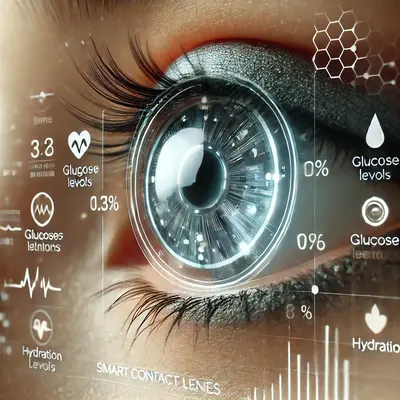Imagine waking up, slipping on your contact lenses, and not only improving your vision but also having real-time updates on your blood glucose levels or receiving notifications about dehydration. This is not science fiction anymore—smart contact lenses are already shaping the future of healthcare and vision correction. From tracking vital health metrics to enhancing our everyday lives, smart lenses are poised to revolutionize how we monitor our health.
“Smart contact lenses are reshaping personalized healthcare by offering non-invasive glucose monitoring.” — HealthTech Journal

Take for example, Clara, a 38-year-old woman with diabetes. She constantly struggles to manage her blood glucose levels. But with smart contact lenses that monitor glucose in her tears, she’s now able to keep track in real-time, helping her make better dietary decisions and stay on top of her health.
Symptom Breakdown: What Can Smart Contact Lenses Do?
Smart lenses are equipped with sensors and miniature electronics that can do much more than correct your vision. Here’s a look at their current capabilities and potential:
- Vision Correction: Like traditional lenses, they correct vision issues such as myopia, hyperopia, and astigmatism.
- Health Monitoring: Smart lenses can track blood glucose levels, detect early signs of glaucoma, and even monitor dehydration by analyzing tear composition.
- Real-Time Data Tracking: These lenses can send data to your smartphone or other devices, allowing you to monitor your health metrics throughout the day.
“These lenses integrate seamlessly with mobile apps, providing users with real-time health data.” — Tech Innovations Review
Diagnostic Path: Why the Shift Toward Smart Lenses?
The move toward smart contact lenses is driven by a need for better health monitoring and seamless vision correction. With chronic conditions like diabetes and glaucoma on the rise, there is a growing demand for wearable technology that provides continuous, non-invasive health tracking.
Here are the main reasons why smart lenses are becoming a game-changer:
- Non-Invasive Health Tracking: Unlike traditional glucose monitoring that requires blood samples, smart lenses for diabetes measure glucose levels through tears.
- Convenience and Comfort: People like Eric, who struggle with frequent dehydration, can rely on smart lenses to monitor their hydration levels without having to constantly remind themselves to drink more water.
- Integration with Devices: These lenses are designed to sync with smartphones and other devices, making them accessible and easy to use.
Deep Dive: How Do Smart Contact Lenses Work?
At their core, smart lenses function using embedded microelectronics, sensors, and miniature wireless technology. These elements are embedded into the lens without affecting its transparency or comfort. For example, lenses designed for glaucoma monitoring contain tiny pressure sensors that can measure intraocular pressure (IOP), helping to catch early warning signs of the disease.
| Functionality | How It Works |
|---|---|
| Vision Correction | Lenses have corrective properties like traditional contacts. |
| Glucose Monitoring | Sensors measure glucose in tears, sending data to apps. |
| Hydration Detection | Electrolyte sensors detect dehydration levels in tears. |
| Eye Pressure (IOP) | Micro pressure sensors detect high IOP for glaucoma. |
These lenses are made with flexible materials that adapt to the shape of your eye, ensuring comfort while delivering real-time data directly to a paired device.
“With sensors embedded in contact lenses, we can now detect early signs of glaucoma without invasive tests.” — Ophthalmology Today
Treatment Comparison: Traditional vs. Smart Lenses
While traditional contact lenses are excellent for vision correction, they lack the additional health benefits that smart lenses offer. Let’s break down the advantages of both:
| Feature | Traditional Lenses | Smart Lenses |
|---|---|---|
| Vision Correction | Yes | Yes |
| Health Monitoring | No | Yes (glucose, hydration, eye pressure) |
| Data Integration | No | Yes, with apps and devices |
| Real-Time Alerts | No | Yes |
For individuals like Ahmed, a 60-year-old with a family history of glaucoma, smart lenses could detect early signs of increased intraocular pressure, allowing for prompt treatment and preventing vision loss.
Outcome Story: Real-Life Impact
Take Julia, a tech enthusiast who often pushes her body to its limits during endurance sports. She’s found that smart contact lenses help her manage her hydration levels more effectively, preventing dehydration during long runs. By monitoring her electrolytes through her tears, her lenses send her notifications when it’s time to drink water.
Similarly, Robert, who was recently diagnosed with early-stage glaucoma, uses smart lenses to track his eye pressure daily. This has helped him avoid further complications and maintain healthy vision.
The Future of Vision and Health Monitoring Is Here
Smart contact lenses are not just a vision solution—they’re a revolutionary tool for health monitoring. By tracking critical health metrics, from glucose levels to eye pressure, these lenses provide real-time data, making healthcare more integrated and personalized than ever before. As technology advances, smart lenses will become an essential tool for people with chronic conditions, offering them an easier way to manage their health. With companies like Google and Novartis investing in these innovations, the future of health monitoring is undoubtedly headed toward our eyes.



